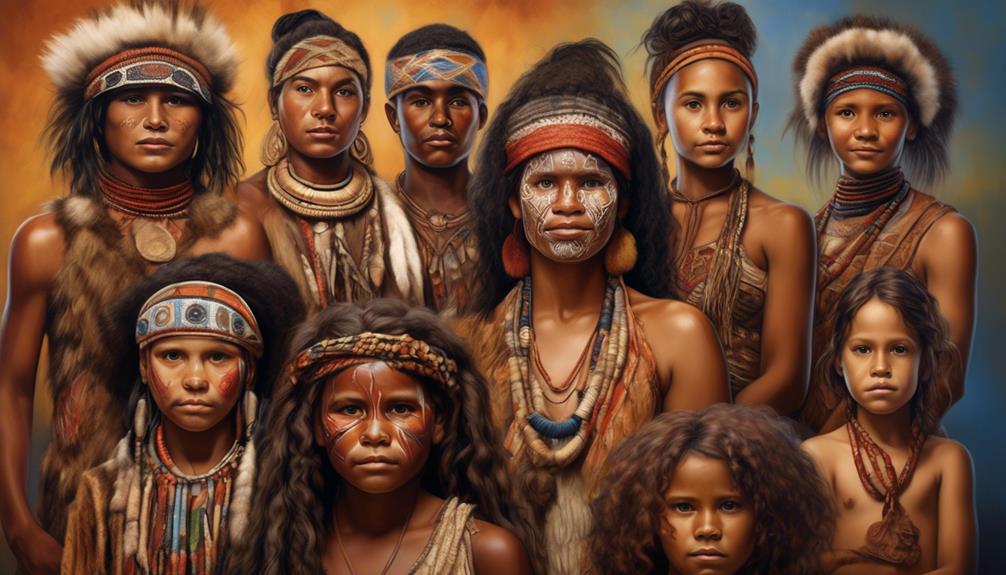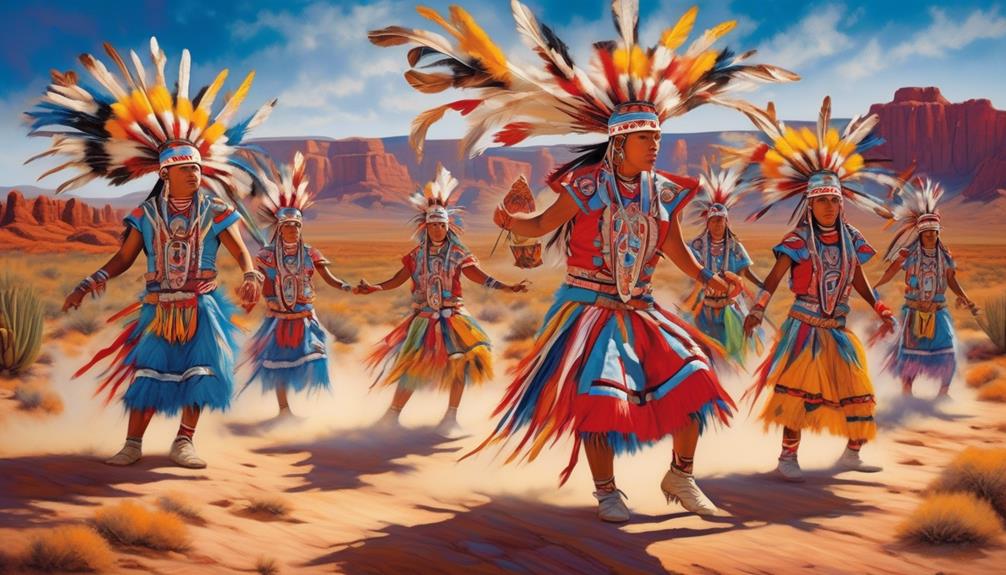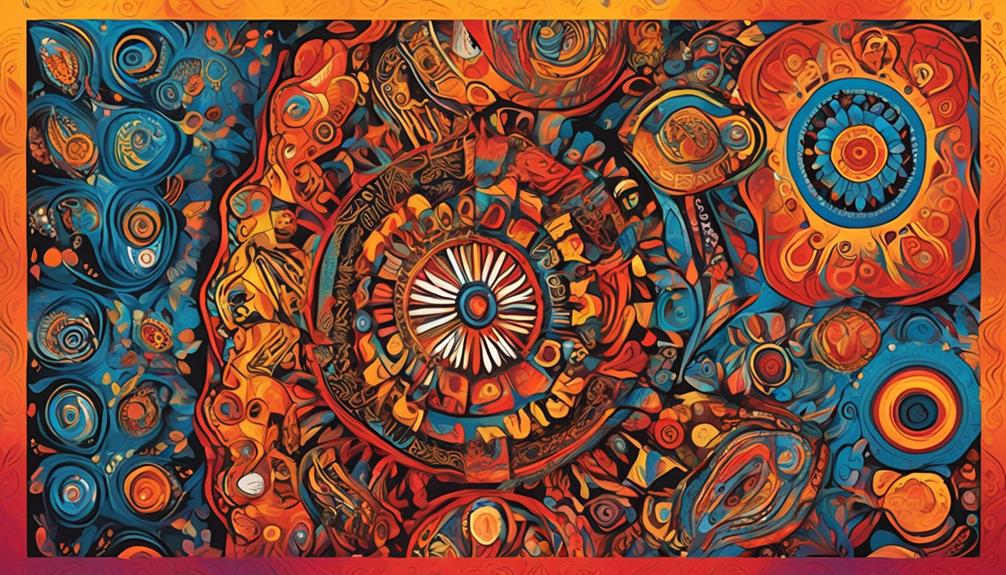It is truly intriguing how often the subject of the ethnic heritage of Aboriginal Australians comes up in discussions. The intricacies of their origins and ethnic identity go beyond a simple answer.
As we explore the genetic and anthropological studies, cultural diversity and traditions, and the impact of European colonization, we start to uncover a rich tapestry of identities and histories that make up the Aboriginal Australian ethnicity.
But what does modern ethnicity mean for them, and how is it recognized in today's society?
Key Takeaways
- Aboriginal Australians have been present in Australia for at least 65,000 years, making them one of the oldest continuous cultures on Earth.
- Aboriginal Australians have a rich cultural heritage, including deep knowledge of the environment, oral traditions, and cultural practices such as Dreamtime stories and songlines.
- European colonization had a devastating impact on Aboriginal Australians, disrupting their traditional practices, leading to social inequality, and forcibly taking away ancestral lands.
- Recognition of Aboriginal Australians' unique identity and promoting social inclusion and understanding are crucial for their well-being, with efforts focused on challenging stereotypes and advocating for equitable representation in society.
Origins of Aboriginal Australians
The origins of Aboriginal Australians can be traced back tens of thousands of years through archaeological evidence and oral histories passed down through generations.
The prehistoric migration of Aboriginal ancestors is supported by archaeological findings, such as stone tools and rock art, which indicate their presence in Australia around 65,000 years ago.
These early inhabitants demonstrated a deep understanding of their environment, utilizing sophisticated hunting and gathering techniques to thrive in diverse landscapes.
Oral traditions further enrich our understanding of their origins, providing valuable insights into their cultural practices, spiritual beliefs, and kinship systems.
Genetic and Anthropological Studies
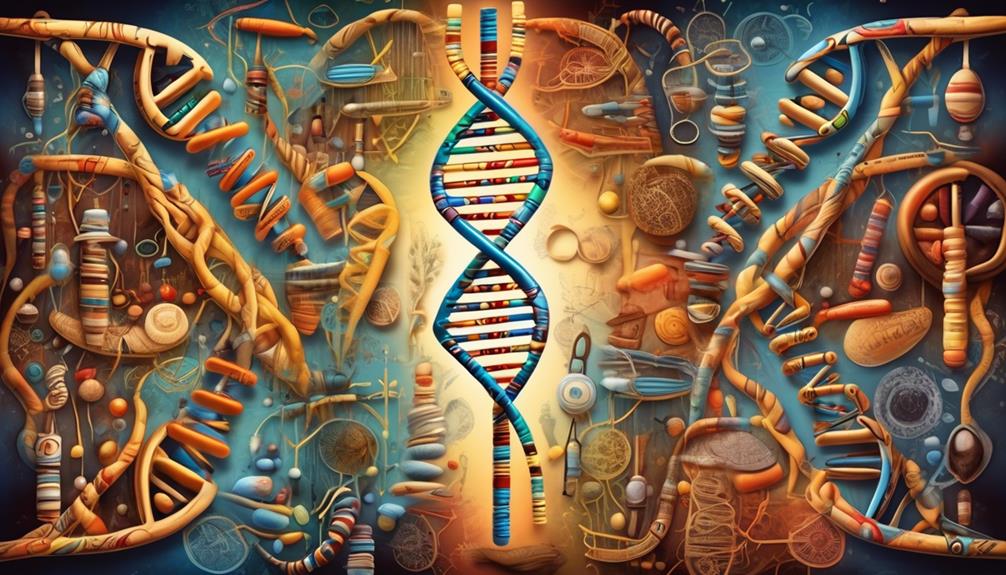
Exploring the genetic and anthropological studies sheds light on the ancestral heritage and evolutionary history of Aboriginal Australians, connecting the archaeological evidence and oral traditions to scientific research findings.
Genetic research has provided valuable insights into the deep-rooted lineage of Aboriginal Australians. Studies have revealed that they're one of the oldest continuous cultures on Earth, with genetic evidence indicating their presence in Australia for over 50,000 years. Through the analysis of mitochondrial DNA and Y-chromosome markers, researchers have traced the ancient migration patterns and population dynamics of Aboriginal Australians, unraveling the complexities of their genetic ancestry.
Anthropological findings have further enriched our understanding of Aboriginal Australian heritage. By studying cultural practices, language diversity, and material culture, anthropologists have uncovered the rich tapestry of traditions and connections that bind Aboriginal communities. These findings not only contribute to the appreciation of their cultural identity but also dispel misconceptions and stereotypes.
Moreover, anthropological studies highlight the resilience and adaptability of Aboriginal Australians in the face of historical and environmental challenges, offering valuable lessons for the broader community.
Together, genetic research and anthropological findings provide a comprehensive narrative of the diverse and enduring legacy of Aboriginal Australians.
Cultural Diversity and Traditions
Studying the cultural diversity and traditions of Aboriginal Australians reveals a rich tapestry of customs, beliefs, and practices that have endured for millennia. The cultural preservation of traditional practices is a cornerstone of Aboriginal communities, and it is essential to understand and respect these traditions in any interaction with Aboriginal Australians. Here is a glimpse into the diverse cultural traditions of Aboriginal Australians:
| Traditional Practices | Description |
|---|---|
| Dreamtime Stories | Oral storytelling of creation, land, and cultural history passed down through generations. |
| Songlines | Complex oral maps that describe the landscape, including important sites, water sources, and food locations. |
| Kinship Structures | Defines relationships, responsibilities, and obligations between individuals and groups within the community. |
| Bush Tucker | Gathering and hunting of native flora and fauna for food, often using traditional methods. |
| Art and Ceremonies | Intricate and meaningful artwork, dance, and ceremonies that hold spiritual and cultural significance.
Understanding the significance of these practices fosters respect and appreciation for the rich cultural heritage of Aboriginal Australians.
Impact of European Colonization
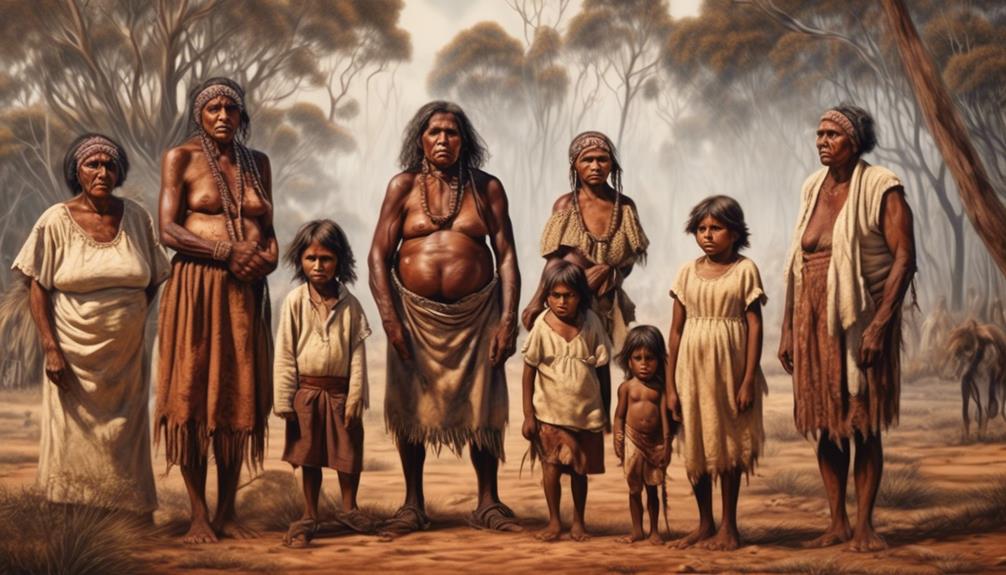
Upon the arrival of European settlers, our way of life was significantly altered, as our lands were colonized and our traditional practices were disrupted. The impact of European colonization on Aboriginal Australians has been profound, leading to enduring social inequality and land dispossession. The consequences of these historical events continue to shape our lives and communities today.
- Social Inequality
- We've faced systemic discrimination and marginalization, resulting in disparities in health, education, and employment opportunities.
- Our cultural values and knowledge systems have often been overlooked, contributing to a lack of representation and voice in decision-making processes.
- Land Dispossession
- Our ancestral lands, which hold deep spiritual and cultural significance, were forcibly taken away, severing our connection to country.
- The loss of land has impacted our ability to practice traditional customs and engage in customary subsistence activities, affecting our cultural identity and well-being.
The enduring legacy of European colonization underscores the ongoing struggles faced by Aboriginal Australians. As we strive for social justice and reconciliation, it's crucial to acknowledge the historical injustices and work towards creating a more equitable and inclusive society for all.
Modern Ethnic Identity and Recognition
The impact of European colonization continues to shape our lives and communities today, influencing our modern ethnic identity and the recognition of our cultural heritage.
As Aboriginal Australians, our modern identity is a complex and evolving concept that encompasses our traditional heritage and our experiences within contemporary society. Achieving social inclusion and recognition of our cultural identity is crucial for our community's well-being and for the preservation of our traditions for future generations.
We're working towards fostering a sense of belonging and pride in our cultural heritage, while also navigating the complexities of modern life. Our efforts are focused on promoting understanding and respect for our unique identity, advocating for equitable representation in all aspects of society, and challenging stereotypes and misconceptions.
Frequently Asked Questions
What Are Some Common Misconceptions About the Ethnicity of Aboriginal Australians?
There are many misconceptions about the ethnicity of Aboriginal Australians. These misconceptions often overlook the rich cultural preservation and contemporary impact of Aboriginal communities.
It's important to recognize that ethnicity isn't solely defined by genetic markers, but rather by a complex mix of cultural, historical, and social factors.
How Do Aboriginal Australians Maintain Their Cultural Traditions in Modern Society?
Maintaining cultural traditions in modern society is crucial for Aboriginal Australians. Cultural preservation involves adapting traditional practices to fit into modernity.
We prioritize passing down our customs and knowledge to the younger generation while also finding ways to incorporate them into contemporary life.
Through art, storytelling, and community events, we ensure that our cultural heritage remains strong and relevant, allowing us to honor our past while embracing the present.
Are There Any Specific Genetic Markers That Are Unique to Aboriginal Australians?
Genetic markers unique to Aboriginal Australians have been identified through population studies. These markers provide valuable insights into the history and diversity of this community.
It's fascinating how these markers contribute to our understanding of human migration patterns and cultural heritage. They serve as a testament to the rich and complex tapestry of Aboriginal Australian ancestry.
It's truly remarkable how genetic markers can illuminate the unique story of this ancient population.
What Role Do Aboriginal Australians Play in Contemporary Australian Society?
In contemporary Australian society, Aboriginal Australians make significant contributions through their art, music, literature, and cultural practices. They play a vital role in social integration by promoting diversity and advocating for indigenous rights.
Their contributions enrich the cultural fabric of Australia, fostering understanding and respect for indigenous heritage. By sharing their traditions and knowledge, Aboriginal Australians help create a more inclusive and equitable society for all.
How Do Aboriginal Australians View Their Relationship With the Land and the Environment?
We understand the deep spiritual connection Aboriginal Australians have with the land. This relationship influences their environmental stewardship, rooted in traditional knowledge.
For instance, the Yolngu people in Arnhem Land have actively engaged in conservation efforts to protect sacred sites and biodiversity. Their holistic approach to land management reflects a profound respect for nature, serving as an inspiring example of traditional wisdom benefiting the environment and future generations.
Conclusion
In conclusion, Aboriginal Australians are a diverse group with a rich cultural heritage.
Genetic and anthropological studies have shown that they've inhabited Australia for over 50,000 years, making them one of the oldest continuous cultures in the world.
Today, there are over 250 distinct language groups among Aboriginal Australians, highlighting the immense cultural diversity within their community.
